| Srl | Item |
| 1 |
ID:
178247
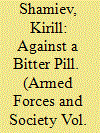

|
|
|
|
|
| Summary/Abstract |
From 2007 to 2012, Russian armed forces faced unprecedented changes that affected their structural, economic, social, and ideological elements. However, not all aims were fulfilled, and some changes were rolled back, despite the political and financial support from Vladimir Putin and Dmitry Medvedev for the defense minister Anatoly Serdyukov. Using the data from 11 interviews with former high-ranking military officers, scholars, and insider press workers, the research shows that the unsustainability of the reform was caused by the radicality of changes, the interest groups influence, and the technocratic policymaking in nondemocratic Russia. In addition, the research demonstrates the strategies the reformers used in order to overcome the resistance from mobilized interest groups. They had not succeeded, that ultimately led to the resignation of the defense minister, which stopped further radical changes in the contemporary Russian armed forces.
|
|
|
|
|
|
|
|
|
|
|
|
|
|
|
|
| 2 |
ID:
167823
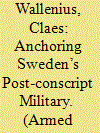

|
|
|
|
|
| Summary/Abstract |
The universal nature of conscription ties or anchors broad segments of society to the military. What happens to societal anchoring after the draft ends? Using in-depth interviews with two groups of elites, this article explores factors that promote and hinder the Swedish Military’s societal anchoring post-conscription. The first group consisted of 18 executives at the Swedish Armed Forces (SAF) headquarters with strategic positions in relation to societal anchoring. The second group consisted of 15 representatives from the corresponding political level: members of the parliamentary Committee on Defense and their officials. The interviews were semistructured and analyzed according to a grounded theory-inspired approach. Main themes concerning obstacles were the public’s low interest and dated knowledge, an unclear political debate resulting in vague expectations concerning the SAF, as well as unclear responsibility for informing the public, and confidence gaps between the military and the political elite.
|
|
|
|
|
|
|
|
|
|
|
|
|
|
|
|
| 3 |
ID:
157493
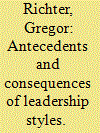

|
|
|
|
|
| Summary/Abstract |
There are numerous studies on the success of various leadership styles that refer to the link between styles and levels of performance and other relevant organizational parameters. Data from a recent survey in a multinational headquarters (HQs) replicate previous findings on leadership style concerning the preferences of the subordinates for more participation in decision-making. Although multinational HQs are in many ways unique organizations that could present unique leadership challenges, too, the findings using traditional models of leadership show how similarly, compared to civilian companies and public administrations, leadership styles are perceived and evaluated by subordinates. Apart from that, the survey data indicate that leadership style—quite different from what was expected—has no significant effect on “organizational commitment” and “mission clarity.” The reasons for that result are discussed against the backdrop of the peculiarities of the organization under investigation.
|
|
|
|
|
|
|
|
|
|
|
|
|
|
|
|
| 4 |
ID:
094654
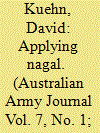

|
|
|
| 5 |
ID:
003058
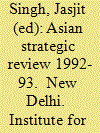

|
|
|
|
|
| Publication |
New Delhi, Institute for Defence Studies and Analysis, 1993.
|
| Description |
334p.
|
| Standard Number |
8186019014
|
|
|
|
|
|
|
|
|
|
|
|
Copies: C:2/I:0,R:0,Q:0
Circulation
| Accession# | Call# | Current Location | Status | Policy | Location |
| 034805 | 355.005095/JAS 034805 | Main | On Shelf | General | |
| 034806 | 355.005095/JAS 034806 | Main | On Shelf | General | |
|
|
|
|
| 6 |
ID:
120592


|
|
|
|
|
| Publication |
Virginia, Marine Corps University Press, 2012.
|
| Description |
x, 479p.Pbk
|
| Standard Number |
9780160913686
|
|
|
|
|
|
|
|
|
|
|
|
Copies: C:1/I:0,R:0,Q:0
Circulation
| Accession# | Call# | Current Location | Status | Policy | Location |
| 057327 | 355.33041/CON 057327 | Main | On Shelf | General | |
|
|
|
|
| 7 |
ID:
053224
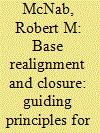

|
|
|
| 8 |
ID:
005694
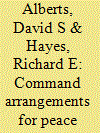

|
|
|
|
|
| Publication |
Washington, D C, National Defence University, 1995.
|
| Description |
x, 136p.
|
|
|
|
|
|
|
|
|
|
|
|
Copies: C:1/I:0,R:0,Q:0
Circulation
| Accession# | Call# | Current Location | Status | Policy | Location |
| 037163 | 355.33041/ALB 037163 | Main | On Shelf | General | |
|
|
|
|
| 9 |
ID:
188789
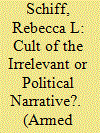

|
|
|
|
|
| Summary/Abstract |
This commentary discusses Michael Desch’s book The Cult of the Irrelevant: The Waning Influence of Social Science on National Security. Desch offers a respectable and important overview of the history of national security within the social sciences from World War I through current times. He focuses on the gradual irrelevancy of political science and particularly the field of international security. Desch, however, neglects the recent university activism and political narratives infusing academic writings and classroom discussions. This review argues that what contributes to the irrelevancy of social science and particularly national security is the new “cult” itself: demands placed on academia and students to become political activists, and not social scientists nor theorists who contribute rigorous academic research affecting domestic and foreign policy. It is the political advocacy narrative itself, embraced by university cultures, that pushes social science and the study of national security down the path of irrelevancy.
|
|
|
|
|
|
|
|
|
|
|
|
|
|
|
|
| 10 |
ID:
061252
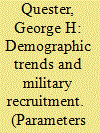

|
|
|
| 11 |
ID:
147786
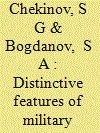

|
|
|
|
|
| Summary/Abstract |
The authors analyze the content of military security in the current period of the 21st century, describe factors that affect it, structural components and levels, and examine evolutionary trends, principal problems, and opinions.
|
|
|
|
|
|
|
|
|
|
|
|
|
|
|
|
| 12 |
ID:
188795
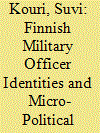

|
|
|
|
|
| Summary/Abstract |
Drawing on the concept of micro-political resistance, this article presents an empirical analysis of how officers of the Finnish Defence Forces challenge, resist, and reinforce the collective military identities constructed within the prevailing organizational discourses. There is a need for identity work to meet the norms and ideals of the military, but individuals can also work as change agents. Micro-political resistance derives from feelings of otherness as well as conflict between the dominant organizational identities and individuals’ personal interests. This study presents a thematic discourse analysis based on texts written by 108 officers and 12 interviews on the theme of “the ideal soldier.” Three main discourses of micro-political resistance were identified: perceiving the profession of a military officer as a job like any other rather than a sacred calling, putting family first, and being oneself instead of embodying the traditional masculine ideal soldier.
|
|
|
|
|
|
|
|
|
|
|
|
|
|
|
|
| 13 |
ID:
092482
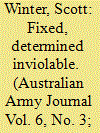

|
|
|
| 14 |
ID:
075815
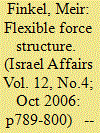

|
|
|
| 15 |
ID:
059261
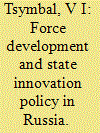

|
|
|
| 16 |
ID:
109814
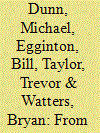

|
|
|
| 17 |
ID:
115248
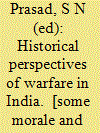

|
|
|
|
|
| Publication |
New Delhi, Centre for Studies in Civilizations, 2002.
|
| Description |
xxx, 437p.
|
| Series |
Project of History of Indian Science, Philosophy and Culture
|
| Contents |
Vol. X
|
| Standard Number |
8187586109
|
|
|
|
|
|
|
|
|
|
|
|
Copies: C:1/I:0,R:0,Q:0
Circulation
| Accession# | Call# | Current Location | Status | Policy | Location |
| 056917 | 355.00954/PRA 056917 | Main | On Shelf | General | |
|
|
|
|
| 18 |
ID:
105850
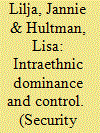

|
|
|
| 19 |
ID:
124065
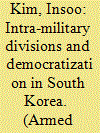

|
|
|
|
|
| Publication |
2013.
|
| Summary/Abstract |
This paper investigates how a highly politicized system of military reshuffling under the authoritarian military regime contributed to the transition to democracy in South Korea in the 1980s. Through an analysis of individual data on 2,666 Korean Military Academy (KMA) graduates, this study shows that promotion policies favored a small group of KMA graduates, called the Hana faction, who were preferentially treated in military promotions and recruited into the military leadership. These biased promotion procedures undermined the cohesion within the military as the marginalized non-Hana faction graduates became increasingly resistant to the subordination of their Hana faction superiors. This disintegration of military cohesion ultimately reduced the regime's capacity to block the transition to democracy.
|
|
|
|
|
|
|
|
|
|
|
|
|
|
|
|
| 20 |
ID:
053223
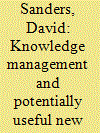

|
|
|